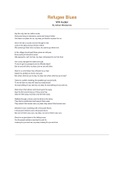Refugee Blues
WH Auden
By Adrian MAckenzie
Say this city has ten million souls,
Some are living in mansions, some are living in holes:
Yet there's no place for us, my dear, yet there's no place for us.
Once we had a country and we thought it fair,
Look in the atlas and you'll find it there:
We cannot go there now, my dear, we cannot go there now.
In the village churchyard there grows an old yew,
Every spring it blossoms anew:
Old passports can't do that, my dear, old passports can't do that.
The consul banged the table and said,
"If you've got no passport you're officially dead":
But we are still alive, my dear, but we are still alive.
Went to a committee; they offered me a chair;
Asked me politely to return next year:
But where shall we go to-day, my dear, but where shall we go to-day?
Came to a public meeting; the speaker got up and said;
"If we let them in, they will steal our daily bread":
He was talking of you and me, my dear, he was talking of you and me..
Went down the harbour and stood upon the quay,
Saw the fish swimming as if they were free:
Only ten feet away, my dear, only ten feet away.
Walked through a wood, saw the birds in the trees;
They had no politicians and sang at their ease:
They weren't the human race, my dear, they weren't the human race.
Dreamed I saw a building with a thousand floors,
A thousand windows and a thousand doors:
Not one of them was ours, my dear, not one of them was ours.
Stood on a great plain in the falling snow;
Ten thousand soldiers marched to and fro:
Looking for you and me, my dear, looking for you and me.
, Summary Outline: By Adrian Mackenzie
Written before the start of WWII.
“Refugee Blues” is about the plight of Jewish refugees in the 1930s.
They are outsiders, refugees and have no home.
They have been pushed out - them vs us.
Note on Blues Music - Associated with strife and struggle, melancholic and often
mournful.
Form:
➔ Form of the poem mimics Blues rhythm and rhyme.
➔ Rhyme scheme AAB
➔ Consistent Rhyme scheme demonstrates that their plight is unchanging.
Theme:
➔ Xenophobia - Anti-Semitism and Complicity in Prejudice
Mood:
➔ Futility
➔ Hopelessness
Stanza 1:
Say this city has ten million souls,
Some are living in mansions, some are living in holes:
Yet there's no place for us, my dear, yet there's no place for us.
● ‘Ten million souls’ - Synecdoche = de-humanised
● ‘Mansions’ and ‘holes’ - demonstrates the class division. Vastly different and contrasting
lifestyles.Whether they’re rich or poor, they all have homes and a place in society. (Nice
or not)
- Mansions are a symbol of wealth and privilege, people who live in them are
comfortable and aren’t threatened by people like Hitler.
- Holes are a symbol of poverty. The poor may not live in ‘Mansions’ but at least
they have homes.
● ‘No place for us’ - despite the class division and everyone else having a place, they still
have no place.
● ‘Yet there’s no place for us’ - repetition enhances the poignancy or direness of their
situation as they have no place.




